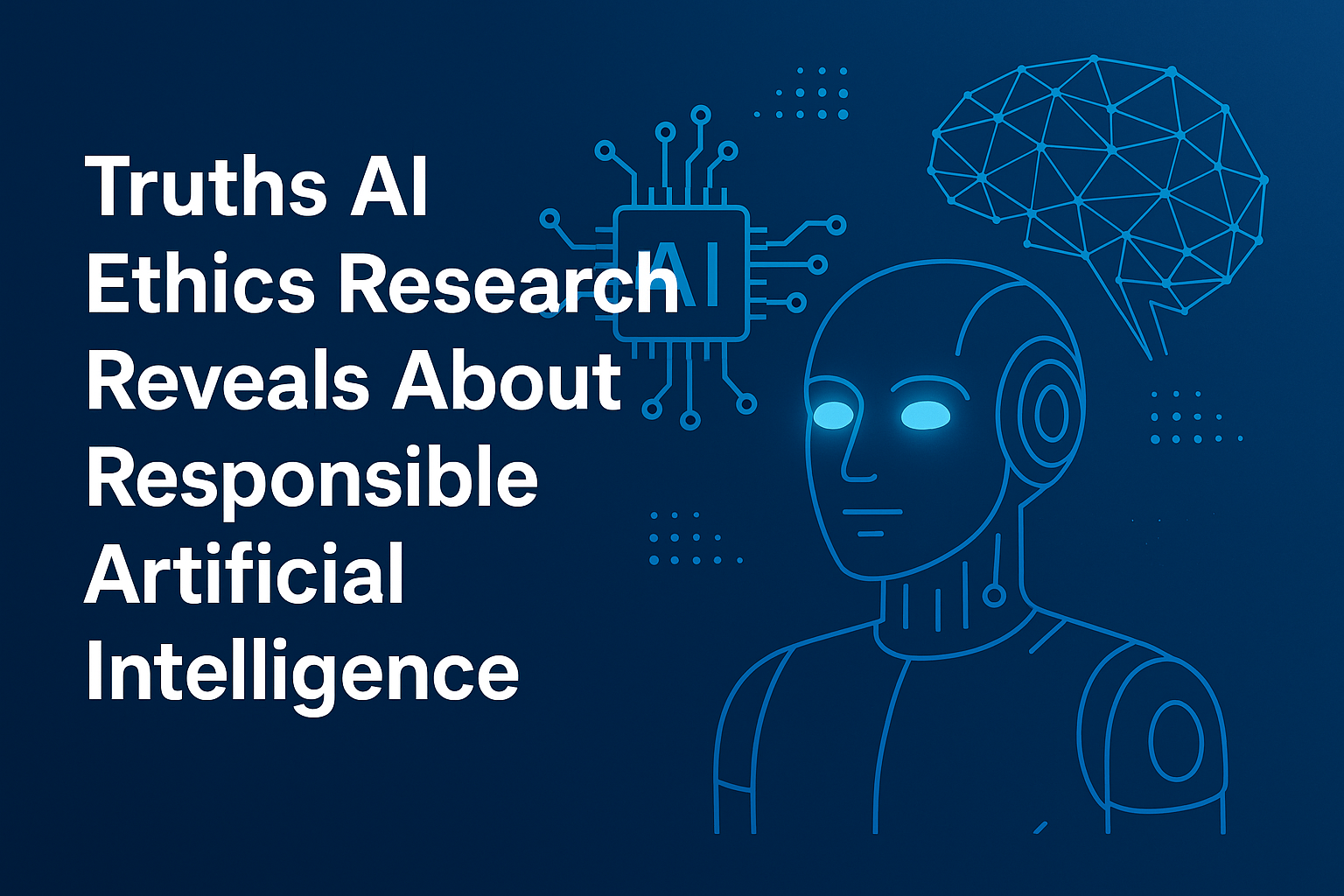Artificial Intelligence is transforming every sector — from finance and healthcare to criminal justice and education. But with this transformation comes a responsibility that most developers, businesses, and policymakers are still catching up with.
At the core of this responsibility lies AI ethics research — a field dedicated to identifying the ethical implications of artificial intelligence and guiding the creation of systems that are safe, fair, and transparent.
If you think this doesn’t affect you, think again. AI touches your life when:
- Your loan application is processed
- A resume gets filtered by a bot
- Your face is recognized by surveillance systems
- An algorithm decides the content you see
The goal of this post is simple: to explain how AI ethics research is holding tech accountable and helping build responsible artificial intelligence that serves, rather than exploits, society.
What AI Ethics Research Really Means
AI ethics research examines the moral, legal, and social impact of artificial intelligence. It bridges gaps between engineering, policy, law, and philosophy to answer difficult questions like:
- Who is responsible when AI makes a harmful decision?
- How do we ensure AI systems are fair across demographics?
- What does “explainable” AI really mean in practice?
- How should AI interact with human decision-makers?
This isn’t hypothetical work. Researchers uncover how these systems function in the real world, often uncovering risks long before they reach public awareness.
Major universities such as Oxford, MIT, and Stanford lead academic work in this space. Global institutions like the Alan Turing Institute and UNESCO develop guidelines that influence laws. Corporations like IBM, Microsoft, and Google invest in ethical frameworks, toolkits, and safety teams, often influenced by what academic research uncovers.
AI Ethics Examples
AI ethics examples show how ethical ideas apply to real AI systems. One well-known example is Amazon’s hiring tool. It unfairly downgraded resumes with the word “women’s.” This showed bias against female candidates. This AI ethics example highlights how bias in data can cause real harm.
Facial recognition is another important AI ethics example. Studies show it often fails to recognize women and people with darker skin. This leads to wrongful arrests and discrimination. These problems reveal why fairness is a key part of AI ethics.
Many AI systems are “black boxes.” This means we don’t know how they make decisions. In healthcare and law enforcement, this lack of transparency can cause serious mistakes. This is a common AI ethics example that demands explainability.
Privacy is another concern. AI often collects data without clear consent. Surveillance tools and data mining raise big questions about user rights. These privacy issues are frequent AI ethics examples.
Finally, accidents involving self-driving cars show a need for clear responsibility. Who is liable when AI causes harm? This is an AI ethics example that highlights legal gaps.
Together, these AI ethics examples show why ethics must be part of AI design from the start. Without it, AI can cause unfair, unsafe, and harmful outcomes.

Responsible Artificial Intelligence: More Than a Buzzword
Responsible artificial intelligence isn’t a feature or a plugin. It’s a design philosophy rooted in ethics, accountability, and transparency.
Responsible AI ensures that machine learning and automation systems:
- Are explainable and interpretable
- Operate without hidden bias
- Collect and process data with consent
- Include humans in the decision loop
- Offer recourse when things go wrong
And it’s not just theoretical. Real-world failures have made the need for responsibility painfully clear. Amazon scrapped an internal hiring AI after it downgraded resumes with the word “women’s.” In the U.S., several facial recognition errors have led to wrongful arrests. In education, predictive tools have misjudged student scores, causing lasting harm.
These incidents reflect what happens when we fail to embed ethics from the start.
9 Brutal Truths AI Ethics Research Has Exposed
1. AI mirrors societal bias
No matter how advanced an algorithm is, if it’s trained on biased data, it will repeat and amplify those patterns. Facial recognition and credit scoring tools have repeatedly shown discrimination against minorities and women.
2. Lack of transparency breaks trust
Most AI operates as a “black box,” with no clear explanation for why it made a particular decision. In critical fields like healthcare or law enforcement, this leads to life-altering errors with no accountability.
3. AI is fragile by design
Small changes in data inputs can drastically change outputs — sometimes with malicious intent. These “adversarial attacks” make even robust systems vulnerable to misuse.
4. Ethical standards vary across borders
Without a global ethics agreement, an AI that is deemed legal in one country could violate laws or human rights in another. This creates loopholes for unethical deployment.
5. Ethics boards often lack power
While many companies establish ethics boards, they are frequently advisory in nature. History shows they are disbanded or ignored when business interests are threatened.
6. Consent is often absent or unclear
AI systems gather data quietly — through cookies, cameras, microphones, and third-party platforms — often without proper opt-in consent. This contradicts most data protection laws.
7. No clear liability when AI harms
If an autonomous vehicle crashes or an AI makes a medical error, responsibility is murky. Legal frameworks lag far behind the pace of technological advancement.
8. Facial recognition consistently fails minorities
Multiple peer-reviewed studies confirm that facial recognition is less accurate on darker skin tones and women. Despite this, it is still used in law enforcement, leading to wrongful arrests and profiling.
9. Ethics is not part of standard engineering education
Most computer science students graduate without ever taking a course in AI ethics. This gap in education has direct consequences in how systems are designed and deployed.
What AI Ethics Research Recommends
Ethics researchers propose practical interventions for making AI safe and fair:
- Establish independent review boards for auditing AI systems
- Require transparent documentation (like “model cards”) detailing datasets, limitations, and performance
- Use differential privacy and federated learning to protect user data
- Create red-teaming protocols to identify vulnerabilities
- Mandate human oversight in high-risk AI deployments
- Push for binding legal frameworks that enforce responsible design
The emphasis is clear: responsibility must be designed in, not bolted on.
Where to Learn AI Ethics: Best Courses & Certifications
Given the growing demand for ethical oversight in AI systems, learning AI ethics is now a valuable and necessary skill — not just for researchers, but for developers, product managers, policy experts, and business leaders.
Here are some of the top courses currently available:
- Elements of AI – Ethics Track (University of Helsinki): Free, beginner-friendly, and government-endorsed.
- AI For Everyone by Andrew Ng (Coursera): Offers a strategic overview including ethical implications.
- Ethics of AI and Big Data (edX – Linux Foundation): In-depth, intermediate course for professionals.
- Data Ethics, AI and Responsible Innovation (University of Cambridge): Ideal for researchers and policy experts.
- Responsible AI Specialization (Microsoft + LinkedIn Learning): Designed for tech leads and product teams.
These courses cover not only ethics frameworks but also the social, legal, and cultural contexts in which AI operates. Many include real-world case studies, compliance frameworks, and tools like fairness metrics, bias audits, and ethical impact assessments.
Enrolling in such a course can help professionals:
- Identify blind spots in product design
- Conduct ethical risk assessments
- Lead responsible AI initiatives
- Prepare for upcoming AI governance regulations
Ethics can no longer be an afterthought — it must become a core competency in the age of AI.
Leading Institutions Advancing Ethical AI
Organizations and labs actively translating ethics research into practice include:
- Partnership on AI – Brings together Amazon, Google, Apple, and civil society groups
- OpenAI – Includes safety layers and publishes ethics updates alongside model releases
- AI Now Institute (NYU) – Investigates the social implications of AI
- UNESCO AI Ethics Framework – Provides a global standard adopted by over 190 countries
- AI Fairness 360 by IBM – A toolkit helping developers measure and reduce bias
Their work forms the foundation for industry standards and national policies.
Why It Matters More Than Ever
AI is no longer a back-end tool. It powers recommendations, credit checks, healthcare decisions, law enforcement, hiring, and education.
Without AI ethics research guiding its development, we risk creating a digital future that is efficient — but unfair, opaque, and harmful.
The systems we build today will shape the rights, opportunities, and realities of tomorrow. Responsible artificial intelligence is not a luxury — it is a necessity.
And ethics is not a blocker to innovation — it is what makes innovation trustworthy.
Further Reading and References
You may also want to read:
Ethical AI and Responsible AI – What’s the Difference?
The Takeaway: Ethics is the Foundation of Trust
The uncomfortable truths exposed by AI ethics research are not just warnings. They are calls to action. We cannot afford to treat ethics as a checkbox. Ethics must be embedded into every line of code, every dataset, every model decision, and every user interface.
If you work with AI — or are impacted by it — it’s time to demand more than performance. It’s time to demand responsible artificial intelligence that earns our trust.
Speak up. Build better. Share this knowledge. Because the future of AI isn’t just about intelligence. It’s about integrity.
Disclaimer:
The information provided in this blog post, “Truths AI Ethics Research Reveals About Responsible Artificial Intelligence,” is for informational purposes only. While we strive to present accurate and up-to-date content, this article does not constitute professional advice on AI ethics, technology, or related legal and policy matters. Readers are encouraged to conduct their own research or consult with experts for specific concerns or questions. The opinions expressed herein are those of the author and do not necessarily reflect the views of any organization or institution.

